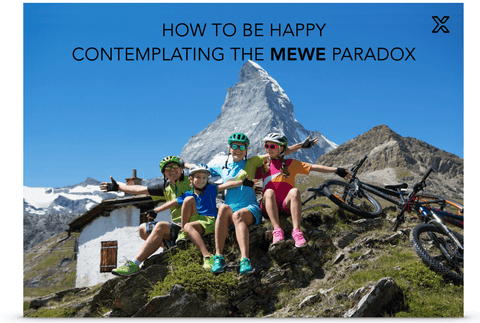Most of us genuinely want to be happy. After all, what is more, important than happiness? If you list the most valuable life aspects, happiness would be in the top five. Where would sports and HealthSpan be?
It's a shame that a happiness course isn't taught in most schools. Some believe it is a skill that can be learned. It is a skill of the mind – a capacity to shape the way we see, process, and interpret our reality. Happiness can be developed like any other competence. Let's explore.
ARE WE HAPPY?
With planet Earth reaching the 8-billion-mark in human population, I wonder how many of these 8 billion people are truly happy – even merely content? Further, it is projected that approximately 120 billion humans have inhabited planet Earth over time. How many of those souls lived a happy life?
For as long as history has been recorded, wars have occurred due to religion, power, land, wealth, ideologies, science, revenge, and many other reasons. All believed their cause was just, and if the conflict were won, happiness would be the result.
As humans continue to battle the ills of disease and war, it is essential to remember there exists a universal desire for happiness and the capacity of individuals to rally to each other's support in times of great need. The World Happiness Report ( www.worldhappiness.report ) reveals that social support, generosity to one another, and honesty in government are crucial for well-being and happiness.
Finland, Denmark, and Switzerland's populations take the top spots on the happy scale. It's not hard to understand that at the very bottom of the ranking, we find societies that suffer from conflict and extreme poverty. By the way, the US is ranked 16th on the happiness report. The findings demonstrate that communities with high levels of trust are happier and more resilient in facing a wide range of crises.
So how do global issues affect your happiness? Of course, the reasons for life satisfaction vary and are inherently intertwined. Whether you like it or not, your happiness can be disrupted or enhanced by people and events around you and the world.

MEWE
Come with me down this rabbit hole called "my happiness." We live in a world that is more and more focused on "Me" and not "We." More of us are obsessed with the 'selfie' or 'me-me-me culture' – dangerously bordering on grandiose narcissism.
Minimal human interaction is giving way to an abnormal, self-obsessed society where nobody cares for others. This leads to a confused, intolerant, diffident, anxious, unhealthy, and socially unfit culture. This is not happiness.
But happiness is not just eluding the Millennials. Those well into our careers or have most in our rearview mirror are also guilty of underinvesting in our relationships. Success, achievement, material possessions, and social status represent the biggest impediments to finding true happiness.
Consider the MeWe paradox. If you want happiness, first take a hard inward look, and realize how much of it is currently only about you. The key to finding joy is to invest in relationships.
In a "Me" space, it's all about "mine." It's full of competition and scarcity. "Me" space is about doing things my way.
In a "We" space, it's more about "us" and the community. We must have feelings of safety, connection, belonging, and acceptance to find this. We must trust others. That's where we thrive as human beings.
"Me" space is limited by one person. "We" space stops being all about one shining superstar and starts being about community. And when that happens, an infinite number of possibilities suddenly show up.
Those in the "We" space nurture friendships with others doing the same. We move from one satisfaction point in time to the next with a thoughtful purpose. We are growing, learning, exploring and open to the incredible world of wonderment.
Decide to pause from "Me" and consider all the wonderful "We" opportunities around us. Seek purposeful ways to engage with others. Connect and interact in a more meaningful way. Serve someone or some group around you.

YEARN TO LEARN
I regularly listen to podcasts, and one of my favorites is by Peter Attia, MD. I've recommended his podcasts in previous blogs. For many years, he has interviewed brilliant, thoughtful people. He goes deeper than most interviewers and explores various topics, primarily focusing on Healthspan.
This week, I listened to podcast #226, The Science of Happiness, with Arthur Brooks, a social scientist and professor at Harvard University. Brooks discusses three tenets of happiness in this podcast: enjoyment, satisfaction, and purpose. His message is simple, powerful, and a concept that can be adapted for those inclined.
Here's what I synthesized from the enjoyment-satisfaction-purpose model: If we find areas of life that bring us true enjoyment, if we can understand that satisfaction is fleeting, and if we can move from one moment of satisfaction to the next with a purpose, then happiness is attainable. If "purpose" is about serving others, our "We" journey will yield excellent results.
Learning is one of the top 5 requirements for my personal quest for happiness. I thoroughly enjoy exploring and studying others who have devoted time to research valuable areas of life, like happiness.
I am going out on a limb here. I only recommend books after first reading them myself. After listening to this week's podcast with Peter and Arthur, I immediately jumped onto Audible and purchased Strength to Strength by Arthur C. Brooks. This is how I explore and find amazingly brilliant minds to pull into my life.
I highly recommend the following resources for those seeking depth and great value.
Body Helix brings you informative and inspiring messages. We are dedicated to cultivating and exploring a growth mindset and salutogenesis. In addition to offering our quality compression products and hydration formula, we can share encouragement, support, and motivation to help cultivate your healthspan goals.

Learn. Share. Inspire.
Have a thoughtful day!
Coach Fred

